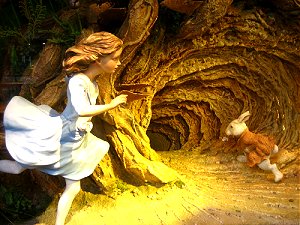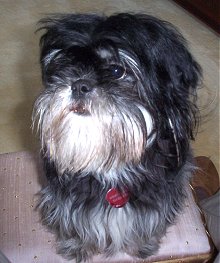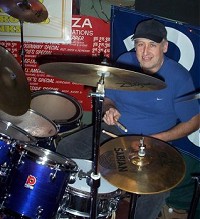
The five other members of my immediate family were or are all obese. I escaped that fate for a few reasons, the least of which was my chronic ambivalence around food.
Don't get me wrong. I love food and love to eat, but if someone told me there was no more of the food I liked, or I could only eat potatoes for the rest of my life, I could live with it.
My family did with food what most post-Depression Era families did: Teach the children to eat three "square" (big) meals a day; always, always finish your plate; and, of course, consider all the starving children in Africa (or China, or Harlem--whatever provided the most wanton image). This last one usually made me laugh even as a child. In fact, I can remember when my mom first said that in all seriousness, and I laughed out loud. I'm not sure why I laughed at the time--probably because of the incredible disconnect that my parents were directly feeding the hungry children of the world, and because I wasn't starving, I must eat more for those children? Didn't make sense.
My friend, Gary, said he used to tell his parents, "Well, then why don't we mail these poor children this food I'm not going to eat." That made more sense!
The combination of childhood food ambivalence, an ongoing spiritual quest, and the deep inner belief in what I called "radical self-reliance," led me to discover Breatharianism. It is pretty much what it sounds like--the practice of discovering the human body's innate ability to survive without the intake of solid food, and in some cases without the drinking of liquids.

Google Breatharianism and you'll find many example of famous breatharians throughout history, including many yogis and monks who eschewed (pun intended) food in favor of
prana or "life force".The practice is centered around using the life force within and around us as food, or as a superior form of food--whichever works for you.
There are many techniques to turn on the "prana food" switch in the body, but it takes practice, time and, well, effort. Needless to say, the number of people even interested in this is small, but they do exist, and new breatharians create themselves every day.
No discussion about breatharianism is complete without bringing in the work of
Jasmuheen from Australia. She is one of the most high profile and controversial of the breatharians alive today. In her pre-Jasmuheen life she was Ellen Greve, a financier. (As with most pioneers in any given area, Wikipedia has an annoying snarkiness in their "objective" analysis of her work).
Anywho, she wrote a book back in the 80s called "Living on Air: A 21-Day Program of Freedom", or something like that. I ate it up (heh heh). But after reading the book and very seriously considering doing the program, I was faced with a real dilemma. What am I actually considering doing here? Giving up food for the rest of my life? (I was 30-something at the time). What would be the social consequences (of which there are a LOT)? I ended up realizing that, 1. I really do love to eat and I thought I'd really miss it; and 2. My wife, friends, and other family would just not understand what the hell I was doing. I mean, I was already considered weird enough...
Instead, I decided to try the next best thing: fasting. I read all about fasting; talked with people who had done a lot of it, and started doing it myself. I tried a week, then two weeks, then a month. I tried water-only fasts, juice fasts, and even a spirulina fast.

I explored my body states as I subjected it to food deprivation--at least that's what I
thought I was doing--long meditations, and solitary retreats. There is a certain purity about fasting that goes beyond the body's detoxing and cleaning routines. It's a mental clearing, a spiritual douche, and an emotional catharsis all at once. It's not for everyone. But it seemed to be for me. I liked it.
As I continued to do longer and longer fasts, and longer and longer re-entries back to eating (which is a program all its own--after my first fast of seven days, I broke it with a giant hamburger. That burger is with me today, I swear), I was on a rollercoaster of feeling energized and fresh while fasting, and then heavied out and dull during eating phases. In the very back of my mind that alarmed me, because it meant that maybe my body had already adapted to no food, and maybe I was in some way injuring it by eating. I shoved such thoughts back down and pasted them over with a basic disbelief that something like that might actually be true of my own body.
At my peak, I fasted on water for 54 days straight. In medical literature they say 33 days is the absolute maximum before you starve to death. I was fine. I felt pretty lightheaded toward the end of the fast, and then on the 54th day, I just decided to end it with an apple. I think I got bored in a weird way, or maybe lonely--since I wasn't eating with my spouse, and although she was pretty tolerant, I could tell she was worried about me, and that bothered me, too.
I did a couple of other 10 and 21 day fasts and several 2-3 day fasts until I was around 50. My thinking had changed over the years, and I came to believe that long fasts were not necessarily good for the body. Meanwhile, I was able to consume vast quantities of food without gaining huge amounts of weight--I yoyo'd between 190 and 230 pounds most years. At 6'1" tall, 230 puts me at about 30% body fat, which is the technical definition of obese, and I just couldn't go beyond that. It was not just because I didn't want to suffer the same fates as both my deceased parents who died of obesity-related illnesses. It was more about how my body felt--not being able to bend over to tie my shoes was one red flag, or having to buy bigger clothes--another red flag.
At the risk of making a short story long, I must veer off into my intimate relationships here because it explains or at least sets the stage for what happened during my 60th year with food and pain.

My relationship with women has always been more about "partnering" than role playing. This is an important distinction. Since I was a child I've been acutely aware that I have a feminine side, and although culturally boys are taught to deny that side, I never really bought into that party line. Instead, I liked to experience myself as both feminine and masculine--feminine in the sense that I could sensualize the world, and be a nurturer of it in a way that's harder to explain than I thought right here.
That said, I mostly enjoy my masculine side, and enjoy being a man in this infamously man's world. The thing is, when it came to a relationship with a woman, I have always been attracted to masculine, or strong women; women who were outspoken, and kind of wild. They inspired my own feminine side to sort of come out of the closet so to speak, and to run with them as wolves. I would use my masculinity to be strong, but in a feminine way.
The reason this is relevant to the whole eating food thing became clear (at last) after my most recent relationship ended in the death of my partner. Medically, she died of breast cancer at 54, but spiritually she died because she just didn't want to be in this world very long. She told me this repeatedly throughout our 12-year relationship.
She was an angry person with a very sweet and sensitive side, and I found myself completely entranced with that contradiction. She had a way of kicking my ass and then schmoozing me back that completely mystified me. I was completely being controlled, and with my full permission.
During our time together, she got me into Bikram Yoga (hot yoga), which cured my compressed lumbar discs over an 8-year practice, and she was very supportive of my musician side, when I was gigging 4-5 nights a week and touring 2-3 months out of the year.
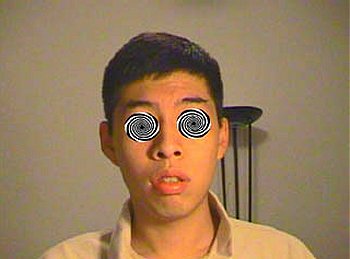
We were business partners as well as housemates, with a small online health products company that she had hired me to build the website for, and how we ended up as intimates. I spent all my time on the company and playing music, and life was pretty good. The thing was, I was hypnotized by her. I was just following her around doing her bidding non-stop, and being able to take a break to do a gig was really the only thing keeping me sane and engaged with the relationship. The thing is, those years spent with her were the healthiest physically I'd ever been in my entire life.
Unsurprisingly, my previous marriage of 17 years had the exact same dynamic to it. I would follow her around doing her bidding instead of simply living my own life. When I finally crawled out of the emotional abuse, I had awful problems with my lower back--I couldn't stand up on my own symbolically.
As the cancer took hold in my partner, I found myself more and more in a caregiver situation, either single-handing the business and the house while she pursued her treatments in Southern California; or in the final days when she needed care 24-7. I found myself collapsing into her relationship with her disease, and lost all self-interest. Not a good thing.
After a 4-month final battle of a mastectomy, pneumonia, and another bacterial infection, she made it over to the other side. I was a wreck. I had no life. I had been running on adrenaline and fixated attention for longer than I realized at the time, and it had changed my body chemistry.
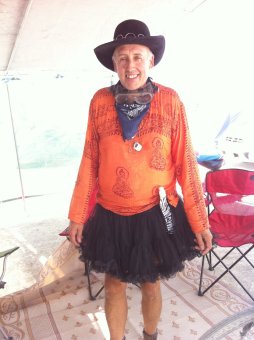
A month or so after her passing I became aware of a huge reservoir of relief that began washing over me. I was on my own now. No more collapsing in, no more ass-kickings, no more emotional abuses. I was free of all that and could now spread my wings and get on with all the things I'd ever imagined I would do if I were independent. I took my RV to Burning Man with my nextdoor neighbor, an internet porn star and 30 years my junior; I dove into comedy improv classes; I took voice lessons; and just did whatever I wanted whenever I wanted. I ate whatever and wherever I wanted, and drank a good amount of wine, and in short, I started having a really good time.
Then the pain came. It started as both shoulders aching at night, and at its peak I was barely able to get out of bed to go pee at night. Pain was excruciating and all pervasive. Aspirin would help, but not much. Before the syndrome got debilitating, I was doing yoga at the local yoga studio, but the pain started giving me problems. I thought maybe I just needed some strength training, so I did Pilates. That led to a knee and hip injury and severe sciatica, so I stopped that. I tried Egoscue, and although I got some relief, there came a time when I could not get down on my knees without extreme crying-out pain. I was miserable and felt like a 120 year old, or something maybe like 180...
One of my other deep interests is in mind-body medicine. This field has always been near and dear to me, because I had experienced first hand many times the profound healing potentials of the human body, and the equally profound and potent effects that the mind can have on the body. In this culture, we are taught that we ARE bodies, so if there is disease, then there is something wrong with us, and we need to be "fixed" by trained professionals. I never fully bought into this model, and as a result rarely consulted an MD, and only occasionally a naturopath. I didn't like what diagnoses do--they solidify a condition, or a false "truth", so that this truth becomes your belief, and that belief prevents the body from healing.

I conjectured that the pain may be some sort of rheumatic arthritis, maybe brought on by candida overgrowth, or maybe I had picked up some parasite when I was in Mexico where we were seeking non-FDA treatments for my partner's breast cancer. But I didn't want to get too much into self-diagnosis because that creates basically the same situation as an official medical diagnosis mind-body-wise.
I had some breakthroughs in understanding from reading up about
German New Medicine. My friend and consultant,
Dr. Carolyn Dean, had turned me on to it. This modality says that the body is in a constant state of repair and healing. It is traumatic events that stick
the mind's attention in the moment of the trauma, and the body doesn't know the difference between a past injury carried forward by the mind and a current trauma taking place now. This is also reminiscent of Dianetics, and several other modalities, but it made a great deal of sense to me. The body was just dealing with so many unresolved traumas that eventually they just added up, and the passing over experience of my partner was a sort of last straw cascading into this pain syndrome.
Then I ran into Access Consciousness, and it all fell together for both me and my body. Founded by Gary Douglas about 20 years ago, Access Consciousness posits that the universe is responding to everything you are thinking. The body is responding to everything you're thinking, especially judgments and conclusions you've made about it.
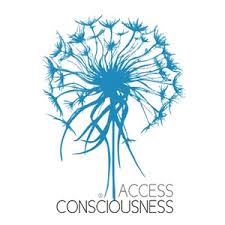
One of the Access Body processes is to ask the body what it wants and needs. This takes a little practice (or a lot depending on where you're at), but it is possible to ask the body, for example, what it would like to look like, or what it would like to eat or drink, or what kind of exercise it would like. The answers are not usually in words--it's more about letting the body direct your attention, and being mindful of the present and where your attention is being directed.
Of course, when I really got this, I started asking it everything and was getting some very clear answers in most cases, and if it was confusing, I would muscle-test by checking if the body moved toward a thing, or away from it, or I ask "Is this light or heavy", going with "light" as the truth.
When it came to asking about this pain syndrome, the body seemed confused. It did tell me it needed more water, and it told me it did NOT like the Paleo diet I was on, and to give it some sugar and carbs once in awhile. It also said it wanted to sleep a LOT, and do some walking every day. I would ask it what food to buy at the store and it would come up with stuff I never would have bought. But when we ate it, it tasted fantastic.
I started feeling better, and I actually had some days that were virtually pain free (still on the 2-3 grams of Aspirin I was taking daily). Yet some days I would just crash and be back where I started. It was confusing and upsetting.
Finally, I asked myself in Access style, "What am I not aware of that if I was aware of it would resolve this pain?" I kept asking that question for several days. One morning at daybreak I woke up with the awareness that my body is saying it does not like FOOD, and as a result has been trying to explain that to me by making my arms and hands hurt, and swelling up my knees and feet (the things I use to procure and ingest food). The body wanted to go back to the fasting days where it was free of having to process all that plant and animal material.
This shocked me somehow, yet was a totally new awareness that explained why this syndrome appeared after my partner's death. The body was holding off with this message while I was in adrenal fight or flight mode--and was chronically in that mode while in relationship with these fierce women. It tried to tell me when I left the marriage with the lower lumbar pain, but I couldn't hear it. When the source of the fight or flight went away upon my partner's death, the body saw an opportunity to tell me what it really needed. After all, I was feeling free, relaxed and comfortably self-contained--a perfect time for a heart to heart with the host... well, if it could get my goddamned attention!
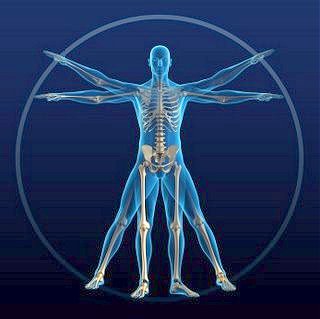
I had been getting some help from Access facilitators, and texted the talented
Cory Michelle that my body had indicated that it was resisting food and creating the pain as a way to communicate that message, but I didn't want to give up eating. Hence my conundrum. She smartly asked, "What are you resisting about that awareness?"
I replied, "It's like I'm giving up something I love."
"Do you love food more than your body?"
"LOL. I have been!" -- and that started a cascade of extreme relief and visions of freedom that were clearly coming from the body.
Cory and I also came up with a technique where I chew and hold a bite in my mouth for a minute or so. This helps all the biochemical signals to register with me as well as provides better enzymatic action.
Another Access process is called "Living in 10 second increments" where you choose what you prefer every 10 seconds. This is useful during eating where I choose to ask the body if it wants the next bite or not, or something different.
In his book, "The Right Body For You", Gary Douglas (Access founder) talks about the illusion of eating food, and that the body doesn't really need it to live. I, of course, was fully aware of that from all my past inquiry into breatharianism. He also said that at some point in his own development, he was able to go to a health food store and just look at the supplements, and his body would indicate it had gotten the energy vibration from the supplement bottles on the shelf, so not to buy any. Further, he said that often times it's just the
taste of food that the body is looking for, rather than cramming a whole lot of it down its throat. In fact, in breatharianism, one of the techniques is to smell food and draw off the pranic energy of it to nourish the body. In old school Ayurvedic medicine, the scent of an herb is considered the most important part of taking the herb.
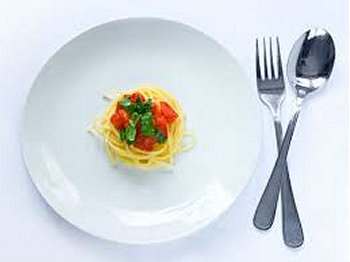
Wow. I had some changing to do! The next day, I was super aware of what the body was now telling me. I had already told it that I was willing to do whatever it wanted me to do to help it to feel and be the way it wanted to feel and be. At first I thought I would be back to water fasting, but it instead was giving me different signals. It wanted to eat a little bit (like a spoonful of peanut butter and cottage cheese or yogurt) in the morning, and then not eat again until 4-5 pm, and then nothing until morning. The first meal was about 4 oz. of carrots with butter and some coconut water. Then it had me getting some turkey slices and making an open faced sandwich with peanut butter. It really likes peanut butter.
I started to see that its solid food nutritional requirements are minimal--not necessarily non-existent, and that I could still get "my food" and not have to give anything up, other than the huge portions.
Before this latest awareness and after I had discovered body communication, one time my body was giving me a strong request for pizza, so what did I do? I ate a whole 12-inch pizza that stuffed me out. The next day was a bad pain day. I was confused because I was eating what the body wanted me to give it, but I was just going overboard on the amount--an old habit fostered by my obese family history, thanks to the Great Depression.
As I ate in this new way, I started feeling lighter, freer. The pain levels went way down and I felt strength returning to my arms and legs. The swelling in my wrists and ankles went away, and my shoulders have started to unfreeze. I'm happy because I'm not making any "sacrifices", and I'm demonstrating love and gratitude for this incredibly talented body of mine.

My whole worldview about what bodies actually are and how we incarnate into them has changed. I gained the deep awareness that these bodies are designed to self-repair--they are
self-repairing organisms. It is what they do. And, they are designed to live as long as their hosts require or prefer. Think about that.
That means that bodies "get sick and die" as a result of the desires of their hosts, and that "disease" is the body trying to communicate (or yelling) to its host its needs and wants.
The body is capable of so much more than we give it credit for. Look what we do to it. We treat it like it was a piece of meat--a meat machine that things just go wrong with, but with medical science we can put it back into "working order," or at least mask and delay its messages. It is all ass-backwards.
Gary Douglas tells us to stop judging our body, and start asking it what it wants, and then be totally unconditionally willing to do whatever it asks of us. It will become a radiantly healthy, beautiful and vibrant organic specimen that will faithfully and joyously serve us for as long as we desire to live on this splendid blue planet.
 Every once in a while, many of us experience a "lifting of the veil," where for a moment we experience the world as One. We feel ourselves as the world, and for an instant get a glimpse of the Grand Creation and our indispensible part in it.
Every once in a while, many of us experience a "lifting of the veil," where for a moment we experience the world as One. We feel ourselves as the world, and for an instant get a glimpse of the Grand Creation and our indispensible part in it.

 This isn't to say it can't be done, it's just that, as Korten would say, because corporations own most of the humanity's resources (including mass media, the educational system and health care), there can be no such thing as "sharing everything with everybody." And it's why I believe corporations were invented in the first place.
This isn't to say it can't be done, it's just that, as Korten would say, because corporations own most of the humanity's resources (including mass media, the educational system and health care), there can be no such thing as "sharing everything with everybody." And it's why I believe corporations were invented in the first place.
 What is it within ourselves that disconnects us from our family, our community, our nation, our world--the earth itself? That disconnected thing within us is what allows all manner of behaviors and outcomes betraying our basic natures. This betrayal is where we lose our faith, where we begin to fear life, harbor suspicions of our fellow humans, and maintain that tried and truly cynical "dog-eat-dog" world view.
What is it within ourselves that disconnects us from our family, our community, our nation, our world--the earth itself? That disconnected thing within us is what allows all manner of behaviors and outcomes betraying our basic natures. This betrayal is where we lose our faith, where we begin to fear life, harbor suspicions of our fellow humans, and maintain that tried and truly cynical "dog-eat-dog" world view.
 The five other members of my immediate family were or are all obese. I escaped that fate for a few reasons, the least of which was my chronic ambivalence around food.
The five other members of my immediate family were or are all obese. I escaped that fate for a few reasons, the least of which was my chronic ambivalence around food. Google Breatharianism and you'll find many example of famous breatharians throughout history, including many yogis and monks who eschewed (pun intended) food in favor of prana or "life force".The practice is centered around using the life force within and around us as food, or as a superior form of food--whichever works for you.
Google Breatharianism and you'll find many example of famous breatharians throughout history, including many yogis and monks who eschewed (pun intended) food in favor of prana or "life force".The practice is centered around using the life force within and around us as food, or as a superior form of food--whichever works for you.  I explored my body states as I subjected it to food deprivation--at least that's what I thought I was doing--long meditations, and solitary retreats. There is a certain purity about fasting that goes beyond the body's detoxing and cleaning routines. It's a mental clearing, a spiritual douche, and an emotional catharsis all at once. It's not for everyone. But it seemed to be for me. I liked it.
I explored my body states as I subjected it to food deprivation--at least that's what I thought I was doing--long meditations, and solitary retreats. There is a certain purity about fasting that goes beyond the body's detoxing and cleaning routines. It's a mental clearing, a spiritual douche, and an emotional catharsis all at once. It's not for everyone. But it seemed to be for me. I liked it.  My relationship with women has always been more about "partnering" than role playing. This is an important distinction. Since I was a child I've been acutely aware that I have a feminine side, and although culturally boys are taught to deny that side, I never really bought into that party line. Instead, I liked to experience myself as both feminine and masculine--feminine in the sense that I could sensualize the world, and be a nurturer of it in a way that's harder to explain than I thought right here.
My relationship with women has always been more about "partnering" than role playing. This is an important distinction. Since I was a child I've been acutely aware that I have a feminine side, and although culturally boys are taught to deny that side, I never really bought into that party line. Instead, I liked to experience myself as both feminine and masculine--feminine in the sense that I could sensualize the world, and be a nurturer of it in a way that's harder to explain than I thought right here.  We were business partners as well as housemates, with a small online health products company that she had hired me to build the website for, and how we ended up as intimates. I spent all my time on the company and playing music, and life was pretty good. The thing was, I was hypnotized by her. I was just following her around doing her bidding non-stop, and being able to take a break to do a gig was really the only thing keeping me sane and engaged with the relationship. The thing is, those years spent with her were the healthiest physically I'd ever been in my entire life.
We were business partners as well as housemates, with a small online health products company that she had hired me to build the website for, and how we ended up as intimates. I spent all my time on the company and playing music, and life was pretty good. The thing was, I was hypnotized by her. I was just following her around doing her bidding non-stop, and being able to take a break to do a gig was really the only thing keeping me sane and engaged with the relationship. The thing is, those years spent with her were the healthiest physically I'd ever been in my entire life. A month or so after her passing I became aware of a huge reservoir of relief that began washing over me. I was on my own now. No more collapsing in, no more ass-kickings, no more emotional abuses. I was free of all that and could now spread my wings and get on with all the things I'd ever imagined I would do if I were independent. I took my RV to Burning Man with my nextdoor neighbor, an internet porn star and 30 years my junior; I dove into comedy improv classes; I took voice lessons; and just did whatever I wanted whenever I wanted. I ate whatever and wherever I wanted, and drank a good amount of wine, and in short, I started having a really good time.
A month or so after her passing I became aware of a huge reservoir of relief that began washing over me. I was on my own now. No more collapsing in, no more ass-kickings, no more emotional abuses. I was free of all that and could now spread my wings and get on with all the things I'd ever imagined I would do if I were independent. I took my RV to Burning Man with my nextdoor neighbor, an internet porn star and 30 years my junior; I dove into comedy improv classes; I took voice lessons; and just did whatever I wanted whenever I wanted. I ate whatever and wherever I wanted, and drank a good amount of wine, and in short, I started having a really good time.  I conjectured that the pain may be some sort of rheumatic arthritis, maybe brought on by candida overgrowth, or maybe I had picked up some parasite when I was in Mexico where we were seeking non-FDA treatments for my partner's breast cancer. But I didn't want to get too much into self-diagnosis because that creates basically the same situation as an official medical diagnosis mind-body-wise.
I conjectured that the pain may be some sort of rheumatic arthritis, maybe brought on by candida overgrowth, or maybe I had picked up some parasite when I was in Mexico where we were seeking non-FDA treatments for my partner's breast cancer. But I didn't want to get too much into self-diagnosis because that creates basically the same situation as an official medical diagnosis mind-body-wise.  One of the Access Body processes is to ask the body what it wants and needs. This takes a little practice (or a lot depending on where you're at), but it is possible to ask the body, for example, what it would like to look like, or what it would like to eat or drink, or what kind of exercise it would like. The answers are not usually in words--it's more about letting the body direct your attention, and being mindful of the present and where your attention is being directed.
One of the Access Body processes is to ask the body what it wants and needs. This takes a little practice (or a lot depending on where you're at), but it is possible to ask the body, for example, what it would like to look like, or what it would like to eat or drink, or what kind of exercise it would like. The answers are not usually in words--it's more about letting the body direct your attention, and being mindful of the present and where your attention is being directed. I had been getting some help from Access facilitators, and texted the talented
I had been getting some help from Access facilitators, and texted the talented  Wow. I had some changing to do! The next day, I was super aware of what the body was now telling me. I had already told it that I was willing to do whatever it wanted me to do to help it to feel and be the way it wanted to feel and be. At first I thought I would be back to water fasting, but it instead was giving me different signals. It wanted to eat a little bit (like a spoonful of peanut butter and cottage cheese or yogurt) in the morning, and then not eat again until 4-5 pm, and then nothing until morning. The first meal was about 4 oz. of carrots with butter and some coconut water. Then it had me getting some turkey slices and making an open faced sandwich with peanut butter. It really likes peanut butter.
Wow. I had some changing to do! The next day, I was super aware of what the body was now telling me. I had already told it that I was willing to do whatever it wanted me to do to help it to feel and be the way it wanted to feel and be. At first I thought I would be back to water fasting, but it instead was giving me different signals. It wanted to eat a little bit (like a spoonful of peanut butter and cottage cheese or yogurt) in the morning, and then not eat again until 4-5 pm, and then nothing until morning. The first meal was about 4 oz. of carrots with butter and some coconut water. Then it had me getting some turkey slices and making an open faced sandwich with peanut butter. It really likes peanut butter.  My whole worldview about what bodies actually are and how we incarnate into them has changed. I gained the deep awareness that these bodies are designed to self-repair--they are self-repairing organisms. It is what they do. And, they are designed to live as long as their hosts require or prefer. Think about that.
My whole worldview about what bodies actually are and how we incarnate into them has changed. I gained the deep awareness that these bodies are designed to self-repair--they are self-repairing organisms. It is what they do. And, they are designed to live as long as their hosts require or prefer. Think about that. 



